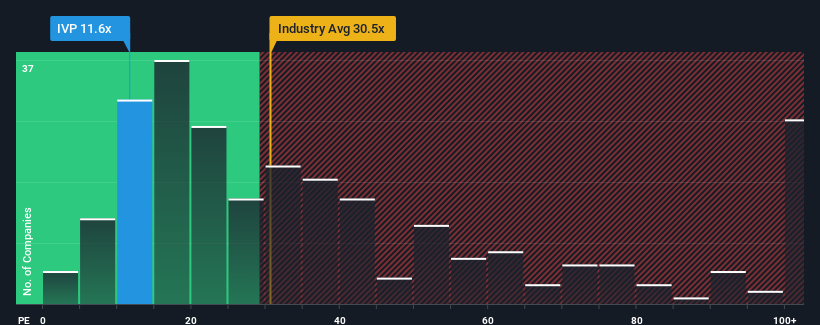IVP Limited (NSE:IVP) Shares Fly 26% But Investors Aren't Buying For Growth
IVP Limited (NSE:IVP) shares have continued their recent momentum with a 26% gain in the last month alone. The annual gain comes to 101% following the latest surge, making investors sit up and take notice.
In spite of the firm bounce in price, given about half the companies in India have price-to-earnings ratios (or "P/E's") above 31x, you may still consider IVP as a highly attractive investment with its 11.6x P/E ratio. However, the P/E might be quite low for a reason and it requires further investigation to determine if it's justified.
Earnings have risen firmly for IVP recently, which is pleasing to see. It might be that many expect the respectable earnings performance to degrade substantially, which has repressed the P/E. If that doesn't eventuate, then existing shareholders have reason to be optimistic about the future direction of the share price.
View our latest analysis for IVP

How Is IVP's Growth Trending?
There's an inherent assumption that a company should far underperform the market for P/E ratios like IVP's to be considered reasonable.
If we review the last year of earnings growth, the company posted a worthy increase of 7.6%. Although, the latest three year period in total hasn't been as good as it didn't manage to provide any growth at all. Therefore, it's fair to say that earnings growth has been inconsistent recently for the company.
This is in contrast to the rest of the market, which is expected to grow by 25% over the next year, materially higher than the company's recent medium-term annualised growth rates.
With this information, we can see why IVP is trading at a P/E lower than the market. Apparently many shareholders weren't comfortable holding on to something they believe will continue to trail the bourse.
The Bottom Line On IVP's P/E
Even after such a strong price move, IVP's P/E still trails the rest of the market significantly. Using the price-to-earnings ratio alone to determine if you should sell your stock isn't sensible, however it can be a practical guide to the company's future prospects.
We've established that IVP maintains its low P/E on the weakness of its recent three-year growth being lower than the wider market forecast, as expected. At this stage investors feel the potential for an improvement in earnings isn't great enough to justify a higher P/E ratio. If recent medium-term earnings trends continue, it's hard to see the share price rising strongly in the near future under these circumstances.
It's always necessary to consider the ever-present spectre of investment risk. We've identified 5 warning signs with IVP (at least 1 which can't be ignored), and understanding them should be part of your investment process.
If these risks are making you reconsider your opinion on IVP, explore our interactive list of high quality stocks to get an idea of what else is out there.
New: AI Stock Screener & Alerts
Our new AI Stock Screener scans the market every day to uncover opportunities.
• Dividend Powerhouses (3%+ Yield)
• Undervalued Small Caps with Insider Buying
• High growth Tech and AI Companies
Or build your own from over 50 metrics.
Have feedback on this article? Concerned about the content? Get in touch with us directly. Alternatively, email editorial-team (at) simplywallst.com.
This article by Simply Wall St is general in nature. We provide commentary based on historical data and analyst forecasts only using an unbiased methodology and our articles are not intended to be financial advice. It does not constitute a recommendation to buy or sell any stock, and does not take account of your objectives, or your financial situation. We aim to bring you long-term focused analysis driven by fundamental data. Note that our analysis may not factor in the latest price-sensitive company announcements or qualitative material. Simply Wall St has no position in any stocks mentioned.
About NSEI:IVP
Mediocre balance sheet second-rate dividend payer.
Similar Companies
Market Insights
Community Narratives




